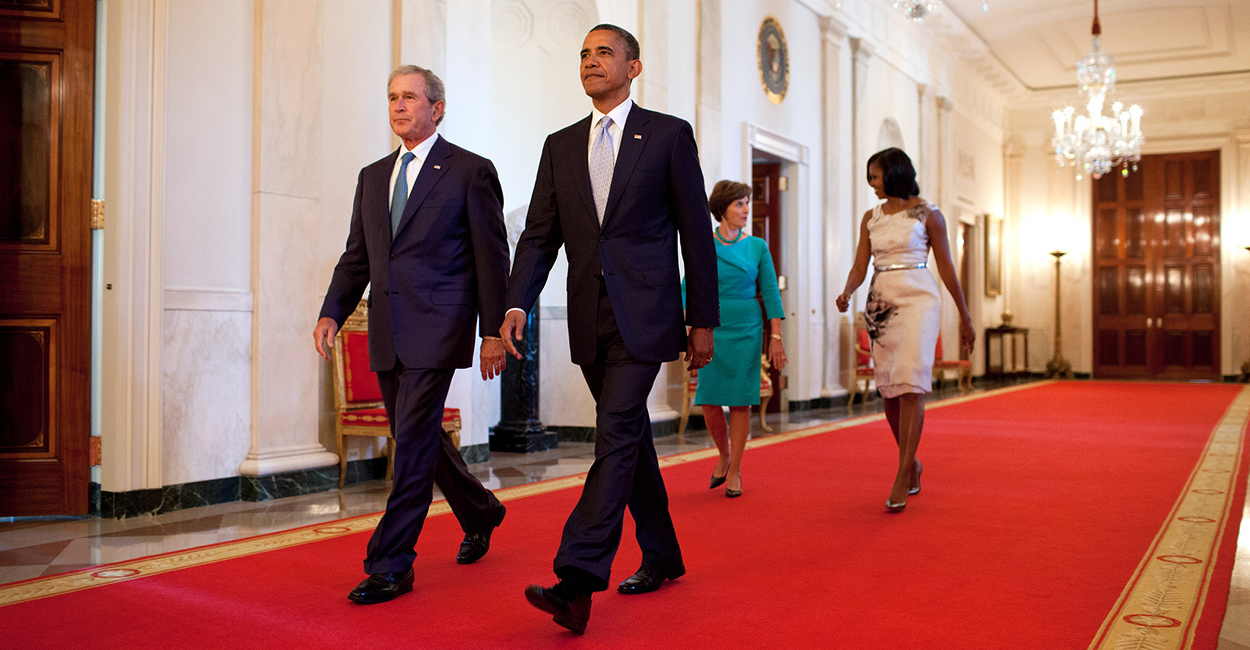[vc_row][vc_column][vc_column_text]On campaign trail for Democrat Governor nominees in New Jersey and Virginia, Obama red flagged racial politics while in a separate event Bush talked of prejudice in public life
Former United States presidents Barack Obama and George W Bush have voiced concern about the current political climate in the US, in comments seen as their veiled, albeit definitely uncoordinated, attack against Donald Trump and his administration.
While Obama, who returned to the campaign trail for Democratic gubernatorial nominee Phil Murphy in New Jersey on Thursday, urged Americans to reject the politics of “division” and “fear”, his predecessor Bush – who belongs to Trump’s Republican party – spoke at an event in New York where he criticised the practice of “bullying and prejudice” in public life in today’s America.
Though neither of the former presidents mentioned Donald Trump by name, the remarks are being seen as their veiled attack at the incumbent US president. The comments of Obama and Bush also highlight the fact that concerns over Trump’s presidency are shared by political leaders cutting across the Republican-Democrat divide of American politics.
Trump, who has been critical of his two predecessors in the past, has not yet responded to the comments even though he is usually very prompt with rebuttals to attacks – even veiled ones – made against him though his Twitter and Facebook accounts.
Ex-presidents traditionally shy away from commenting publicly on their successors. Obama, who demitted office as President of the United States in January this year had said then that he would extend this courtesy for a time to Trump, as George W Bush Jr had to him.
Obama has only occasionally broken his silence on the functioning of his successor and the Trump administration, mostly to comment on issues of national importance, such as immigration, health care and climate change. He had issued statements on Trump’s efforts to dismantle Obamacare, as well as the US president’s controversial travel ban directed against Muslim-majority nations and his decision to abandon the Paris climate accord.
Speaking at the Democratic campaign event in Newark, New Jersey, Obama said Americans should “send a message to the world that we are rejecting a politics of division, we are rejecting a politics of fear…What we can’t have is the same old politics of division that we have seen so many times before that dates back centuries. Some of the politics we see now, we thought we put that to bed. That’s folks looking 50 years back. It’s the 21st Century, not the 19th Century. Come on.”
He touched on similar themes at another event later in Richmond, Virginia, saying: “We’ve got folks who are deliberately trying to make folks angry, to demonise people who have different ideas, to get the base all riled up because it provides a short-term tactical advantage.”
Speaking just hours earlier before Obama at a function in New York, Bush said: “Bigotry seems emboldened. Our politics seems more vulnerable to conspiracy theories and outright fabrication. There are some signs that the intensity of support for democracy itself has waned – especially among the young.”
Bush, whose own tenure as US president had been marked with severe criticism for his alleged war-mongering, the war against Iraq and in Afghanistan, said that Americans have “seen our discourse degraded by casual cruelty” and added that: “At times it can seem like the forces pulling us apart are stronger than the forces binding us together. We’ve seen nationalism distorted into nativism, forgotten the dynamism that immigration has always brought to America.”
Before his election last year, Trump had been highly critical of both Obama and Bush, describing each of them at one time or another as “perhaps the worst president in the history” of the US.[/vc_column_text][/vc_column][/vc_row]



















